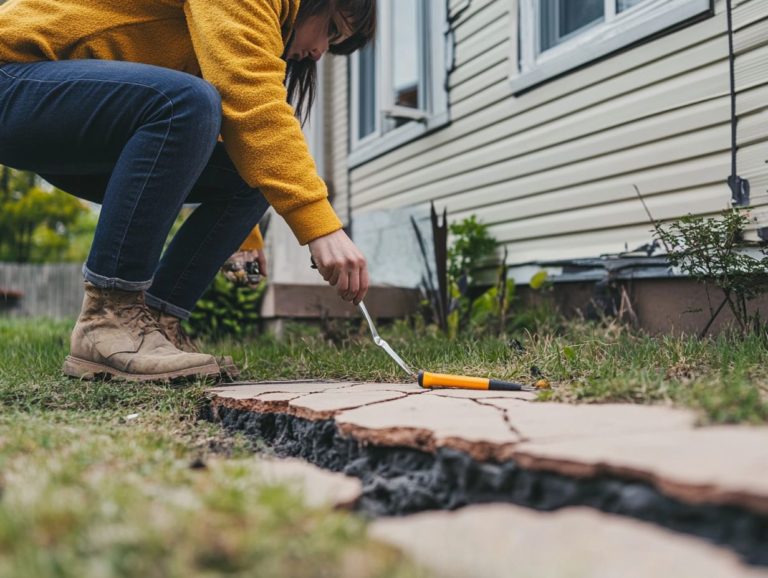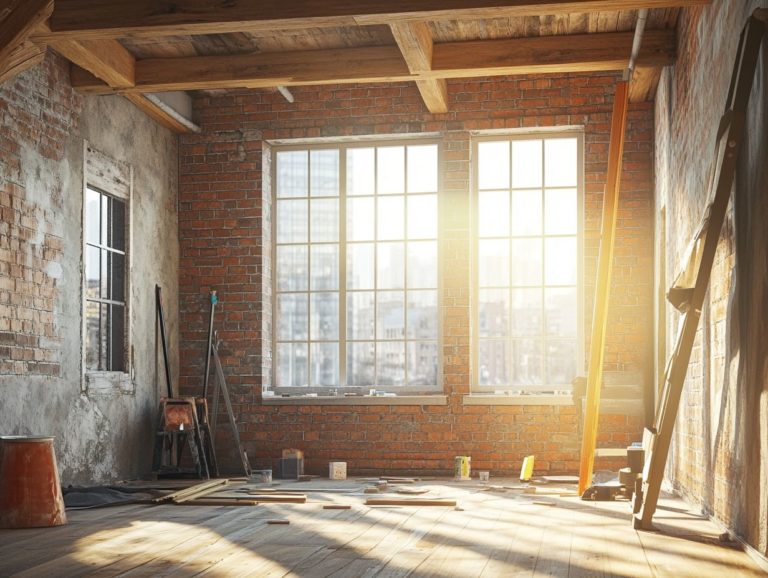5 Steps to a Successful Home Purchase
Buying a home stands as one of the most significant decisions you will ever make. Whether you re a first-time buyer or seeking an upgrade, grasping the process can empower you to navigate the complexities of homeownership with confidence.
This article delineates the five essential steps to a successful purchase, guiding you from determining your budget to closing the deal. It also delves into the benefits of homeownership, highlights common pitfalls to avoid, and emphasizes key factors to consider. You will be thoroughly prepared for this exciting journey ahead.
Contents
Key Takeaways:

Determine your budget and get pre-approved for a mortgage before starting your home search. This ensures a successful purchase.
Research and choose a neighborhood that fits your needs and lifestyle to find the perfect home.
Find a reliable real estate agent to guide you through the home buying process and help you prepare for homeownership to negotiate the best deal.
1. Determine Your Budget and Secure Mortgage Preapproval
Before embarking on the journey of homeownership, it’s vital to nail down your budget and secure a mortgage preapproval. This step confirms your financial readiness and helps you understand the steps to secure a first-time home buyer loan, positioning you advantageously in a competitive housing market.
Understanding homeownership costs significantly influences your budget. These costs go beyond the down payment, which is just your initial investment. They include property taxes, insurance, and ongoing maintenance expenses.
Getting mortgage preapproval is a vital part of the process. It clarifies how much you can afford while demonstrating your financial credibility to sellers. Engage with mortgage lenders who will request essential financial documents like income statements and tax returns.
Maintaining a solid credit score and having manageable monthly debt compared to your income can enhance your mortgage options, making your path to homeownership smoother and more financially sound.
2. Research and Choose a Neighborhood
Selecting the right neighborhood is crucial for you as a homebuyer. It directly influences your quality of life and impacts property values and future resale potential.
A thorough approach to neighborhood research is essential. Dive deep into housing market trends to reveal the nuances of property appreciation or depreciation.
Exploring property listings allows you to gain insights into the variety and availability of homes that cater to your needs. Evaluating school rankings can greatly enhance a neighborhood’s appeal, especially if you have children.
Recommendations from family and friends provide valuable guidance, anchoring your choices in personal experiences. Conducting a market analysis helps you assess home values alongside community dynamics, ensuring that you find not just a place to live but a vibrant environment for your future.
3. Find a Real Estate Agent
Finding a knowledgeable and experienced real estate agent is a crucial step for you as a buyer. This professional will guide you through the purchasing process, ensuring you receive sound investment advice tailored to your needs.
A competent agent should possess extensive knowledge of the local market, including current trends and pricing strategies that can influence your decisions. Strong communication skills are essential; clear and prompt information can make the entire experience less daunting.
Leverage recommendations from family or friends who have had positive experiences. This can lead you to a trustworthy agent who understands your needs.
Consulting a housing counselor can provide invaluable insights, helping you navigate financing options and property evaluations, ultimately boosting your confidence in making a well-informed choice.
As you take these steps toward homeownership, remember that each decision counts. Embrace this exciting journey by exploring 5 ways to save for your first home, and feel empowered to make choices that shape your future!
4. Start House Hunting and Make an Offer

Once you’ve established your budget, selected a neighborhood, and teamed up with a real estate agent, the thrilling journey of house hunting unfolds before you. This is your chance to discover the ideal property while skillfully navigating the intricacies of making a competitive offer in a bustling market. To ensure a successful transition, consider these 5 tips for a smooth closing process.
To elevate your search, utilize online property search tools that filter options based on your specific criteria. This streamlines the process and helps you identify your dream home with ease. Attending open houses gives you a firsthand look at potential properties and offers valuable insight into the neighborhood s character.
As you explore, reviewing home appraisals costs to determine your home’s market value will enhance your understanding of market values and improve your negotiation skills.
When the moment arrives to make a compelling offer, consider putting down earnest money to showcase your commitment. Don t overlook the chance to negotiate for home warranties; these provide reassurance for both you and the seller, ensuring a smoother transaction.
5. Complete the Closing Process
Completing the closing process is a vital final step in your home-buying journey. Here, you ll navigate various closing costs and finalize loan terms, ensuring all necessary documents are executed correctly and that you fully understand your financial obligations.
This stage encompasses several components appraisal fees, title insurance, and attorney fees. Each can add up to a substantial sum that you need to budget for.
Taking the time to review closing documents meticulously is essential. This helps you grasp your commitments and prevents unexpected financial surprises.
Mortgage lenders are your allies in this process, facilitating the distribution of necessary documents and ensuring the loan terms align with what you agreed upon.
Securing home insurance before closing is crucial; it protects your property and meets lender requirements, providing peace of mind as you embark on this thrilling new chapter as a homeowner.
What Are the Benefits of Owning a Home?
Homeownership presents a wealth of benefits that go far beyond simply having a roof over your head. It serves as a powerful investment opportunity, enabling you to build equity over time while relishing the stability and personal freedom that come with owning your own property.
Are you ready to unlock the door to your new home? As you embark on the journey of building equity, you ll discover the potential for significant long-term financial growth, transforming your initial investment into a valuable asset. The tax benefits linked to homeownership further amplify these financial gains, offering deductions that can ease your tax burden.
Yet, the rewards of homeownership aren’t solely financial. Creating a space that reflects your personal style is incredibly fulfilling!
However, it s essential to grasp the costs associated with homeownership, such as property taxes and maintenance expenses. This understanding is crucial for achieving financial readiness, ensuring you are well-prepared for the responsibilities that accompany owning a home.
What Are the Common Mistakes to Avoid When Buying a Home?
The home buying process can be tough. As a first-time buyer, avoid traps like not budgeting properly or misunderstanding mortgage rates. To navigate these challenges, consider how agents can help first-time home buyers, as these pitfalls can lead to unexpected complications down the road.
Such oversights can create financial strain or lead to regrettable choices when the thrill of acquiring your dream home overshadows rational judgment.
To minimize these risks, establish a realistic budget that accounts for not only the purchase price but also additional expenses such as closing fees, property taxes, and insurance.
Conducting thorough home inspections is key; they can reveal potential issues that might require costly repairs, helping you avoid unpleasant surprises. Staying informed about the various mortgage options available and understanding how interest rates can impact long-term affordability is vital for making a sound investment.
What Are the Additional Costs to Consider When Buying a Home?

When you re buying a home, don t forget to consider those extra costs they can really add up! Think about closing costs, home repairs, home insurance, and ongoing property taxes. These can significantly influence your overall affordability.
These expenses can easily catch you off guard if you don t plan for them properly. Closing costs typically range from 2% to 5% of the loan amount. They include fees for appraisals, inspections, and loan origination. Estimating these costs accurately will help you avoid unwelcome surprises on closing day.
It s also wise to set aside a part of your budget for home repairs. Unexpected maintenance issues can pop up when you least expect them. Don’t overlook budgeting for home insurance and property taxes either, as they can vary widely depending on your location and property value.
Taking these extra costs into account now will prepare you for a successful home purchase later!
How Can a First-Time Homebuyer Prepare for the Process?
As a first-time homebuyer, preparing for the purchasing process requires a good understanding of your financial readiness. This means getting approved for a mortgage, planning your budget carefully, and knowing essential steps like home inspections and 5 tips for home appraisal success and closing procedures.
It’s vital to assess your personal finances precisely. This involves not only considering the down payment but also factoring in associated costs like property taxes, insurance, and maintenance expenses.
By obtaining mortgage approval early on, you ll have a clear understanding of your price range. You can show financial credibility to sellers. Know what to expect during home inspections like evaluating the property’s structural integrity and identifying potential repairs to enhance your preparedness.
Know the essential parts of the closing process, such as reviewing closing documents and understanding final costs. This will streamline your journey toward homeownership.
What Are the Important Factors to Consider When Choosing a Home?
Choosing the right home is a complex journey that requires careful consideration of various factors. Think about home values, research neighborhoods, and contemplate any potential repairs all while ensuring everything aligns with your mortgage options and overall budget.
Location is key; it influences not only your daily life but also the long-term potential of your investment. As you explore your options, consider how the size and layout of a home fit your lifestyle.
Do you crave spaciousness, or is a cozy atmosphere more your style? Evaluate the condition of each property you encounter. While new builds often require less immediate attention, older homes may exude charm yet come with hidden repair costs.
It s all about striking a balance between your personal preferences and the realities of the current market. Understanding your affordability in relation to your mortgage options is crucial to avoiding regrets down the line.
By being aware of these factors, you enable yourself to make informed choices, ensuring your investment aligns with your aspirations and the current housing trends.
How Can a Home Inspection Help in the Buying Process?
A home inspection is an invaluable asset in your buying journey. It provides a comprehensive understanding of a property’s condition. This helps you identify necessary repairs and make informed decisions about negotiations and financial commitments.
By uncovering hidden issues like structural concerns, electrical faults, or plumbing deficiencies, a detailed inspection report can significantly sway negotiations between you and the seller. If potential problems arise, this may warrant a reduction in the asking price or prompt the seller to address repairs before closing.
This strategy not only protects your investment but also ensures you aren’t inadvertently taking on unfair financial burdens.
Thus, enlisting a qualified inspector is essential. Their expertise guarantees a thorough evaluation of the property. After the inspection, it’s crucial to carefully review the report. Understanding the implications of any findings can safeguard your financial future.
Ready to start your home buying journey? Take the first step today!
Frequently Asked Questions

What are the 5 steps to a successful home purchase?
The steps include saving for a down payment, getting pre-approved for a mortgage, finding the right real estate agent, searching for your dream home, and using 5 ways to reduce home buying stress to help with closing the deal.
How much should I save for a down payment?
Save at least 20% of your home’s purchase price. This can help you secure a better mortgage rate and avoid private mortgage insurance (PMI) fees.
Why is getting pre-approved for a mortgage important?
Pre-approval gives you insight into your budget and what homes you can afford. It also makes you more appealing to sellers, showing that you’re serious and ready to buy.
How do I find the right real estate agent?
Start with recommendations from friends and family. Research online and read reviews to find an experienced agent who knows your desired home type.
What should I look for when searching for my dream home?
Consider location, size, amenities, and price. Ensure the home meets your current and future needs, and feel confident negotiating for a better price.
What happens during the closing process?
During closing, you sign important paperwork and make the final payment. This is when you pay closing costs and receive the keys to your new home!






